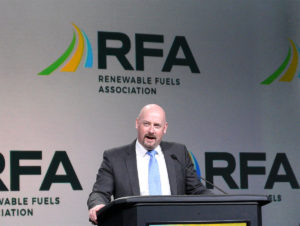 Wells Fargo Crashes and Burns with New RINs Analysis
Wells Fargo Crashes and Burns with New RINs Analysis
Commentary by Geoff Cooper, Renewable Fuels Association
(Last week), equity analysts at Wells Fargo released a note to investors on the subject of the Renewable Fuel Standard and its compliance credit (RIN) market mechanism.
We wouldn’t typically respond to an investment bank research note, but we felt compelled to reply to the Wells Fargo update for two reasons. First, the note is so replete with factual errors, uninformed opinions, and outright falsehoods that we felt the responsibility to correct the record. Secondly, we understand the Wells Fargo note is being shared liberally around Capitol Hill by oil refinery lobbyists hoping to boost their unjustified case for “regulatory relief” (i.e., compliance bailouts). We want to ensure lawmakers and regulators are hearing both sides of the story.
To Pass Through or Not to Pass Through?
Within the span of just the first three sentences of the note, Wells Fargo says “RIN prices pass through to retail consumers,” then claims “merchant refiners struggle to recover elevated RIN costs.” The contradictions continue throughout the report’s introduction, with Wells Fargo stating that waiving renewable fuel blending obligations would cause an “immediate decline” in retail gas prices and somehow financially “benefit” refiners at the same time. Then a few lines later, the analysts admit that “refining profitability would not materially change” with an RFS waiver because “even merchant refiners are capturing” RIN values. Confused yet? So are we. So, which is it? Refiners either pass along (and fully recover) their RIN costs or they don’t. It’s one or the other. It can’t be both.

